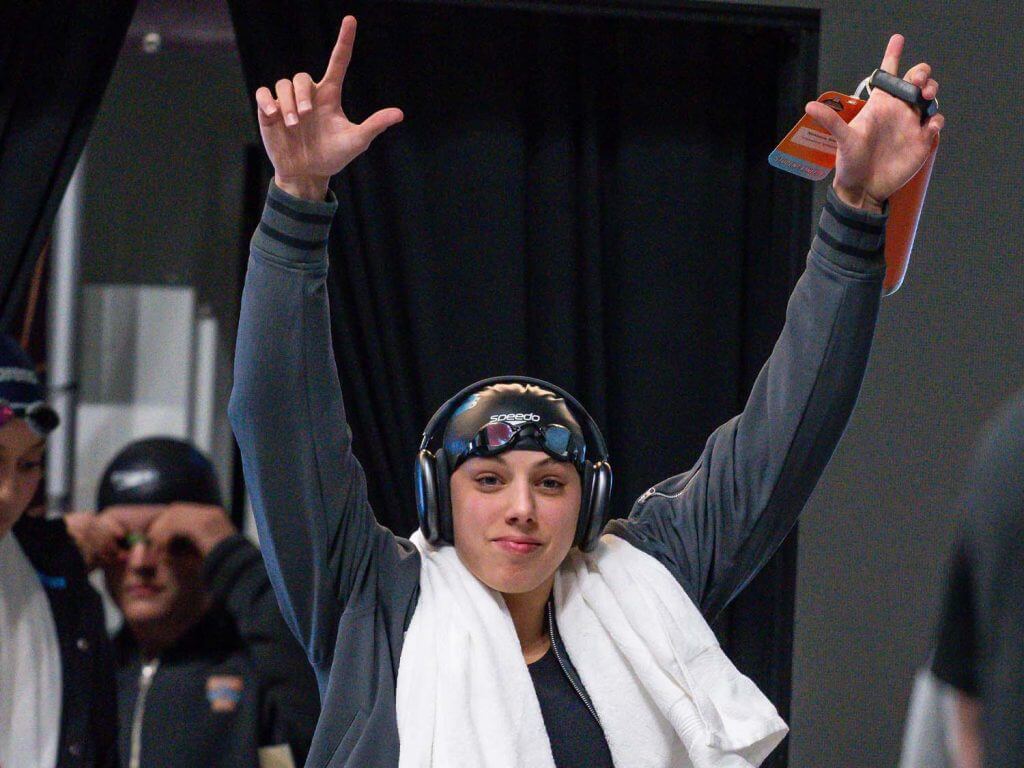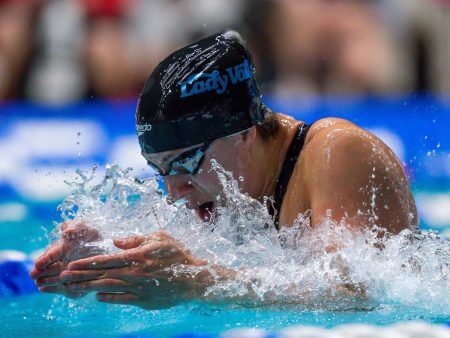Lessons From Hockey Career Helped McKenzie Siroky Excel at First NCAA Championships

Lessons From Hockey Career Helped McKenzie Siroky Excel at First NCAA Championships
At the beginning of her senior year of high school, McKenzie Siroky was focused on her future as a collegiate hockey player at the University of Minnesota-Duluth. But in the ensuing months, Siroky made the tough decision to put her hockey goals to the side in favor of her secondary sport, even though she had never trained or competed in swimming year-round.
In the spring of 2023, Siroky announced a new commitment, to swim at the University of Tennessee following a gap year. Two years later, after honing her breaststroke skills alongside Olympic medalist Mona McSharry, Siroky proved why her life-changing decision was the right one with a third-place finish at the NCAA Championships.
“It’s just an honor to be here,” Siroky said. “Training with Mona is probably one of the best experiences of my life. She’s a great racer and even better human. You can see that when we stand on the block together. We’re just happy to be there together, for each other, compete for our team. It’s just a lot of emotions, happy emotions.”
The dream of competing with the best swimmers in the country percolated when she broke her own Michigan state record at her senior-year high school state meet, nearly cracking the 1:00 barrier in the process. The decision to focus on swimming was finalized when she made the decision to base her future in Knoxville.
At that point, Siroky had never competed in any USA Swimming competition or any long course meet, but less than a year after her initial foray into the 50-meter competition course, she found herself in the Olympic Trials final of the 100-meter breast. Siroky dropped her best time by three seconds from 2023 to 2024, and she ended up qualifying for the Trials final and placing seventh.
When she arrived in college, it did not take long for Siroky to become Tennessee’s top breaststroking option. McSharry took the first semester off after capturing Olympic bronze in the 100-meter breast while returner Emelie Fast dealt with injuries, so Siroky assumed the second leg on Tennessee’s medley relays prior to midseason. When 2025 began, Siroky had best times of 58.00 in the 100 breast and 2:08.17 in the 200-yard event to put herself into the scoring conversation for the upcoming conference and national meets.
At the SEC Championships, Siroky dropped her 100-yard time to 57.27, sending her to the NCAA Championships as the No. 3 seed in the event and on the periphery of the national-title race. Tackling pressurized meets became easier as Siroky turned to McSharry’s vast experience for guidance.
“I had someone to kind of do the meet routine with,” Siroky said. “She has helped me run through a warmup and then the second we both get out, we’ll wait for each other. We’ll go to the warm down pool together. She’ll wait for me if I’m still warming down. And it’s just really nice to have someone to go through that process with and kind of just trust in each other.”

McKenzie Siroky — Photo Courtesy: University of Tennessee Athletics
At the national meet, Siroky started off handling the breaststroke leg of Tennessee’s 200 medley relay, with McSharry moving to freestyle, and the freshman ended up with the fourth-fastest split of the entire event. Siroky qualified for the 100 breast final, a race highlighted by Olympic-medal-winning fifth-year swimmers McSharry and Alex Walsh, and she secured a strong third-place finish. The 33 points from McSharry and Siroky moved the Lady Vols into a top-five position they would not relinquish for the remainder of the competition. Later on in the meet, Siroky added seven more individual points with a 10th-place finish in the 200 breast.
But even amid an extremely successful performance, Siroky admitted she was still adjusting to the realities of high-stakes swimming competitions. Most of her competitors had gotten plenty of practice with those emotions during their prep years at meets leading up to and including Junior Nationals but not Siroky.
“I still struggle with that a little bit. I feel like I’m not at a meet, but I am. It’s weird. I’ve never gone through whole season of a college or club routine. It was a little different understanding what having a dual meet schedule means, and going into a longer season with that into a championship seasons, it’s a little different,” Siroky said. “I never really understood the emotions that come with it. I wasn’t really feeling anything, like I didn’t feel accomplished. Sometimes it just felt like a regular meet. But now here I’m trying to celebrate it more.”
Siroky credited her Tennessee teammates for providing an environment that made the adjustment to full-time swimming enjoyable. She cited coach Matt Kredich as an important source of wisdom.
“He’s very open to listening to how I’m feeling and how he thinks I should be moving forward. I don’t think I’ve really felt burned out this season, and I think big part of that is because Matt kind of knows what training looks like for me and how that should feel,” Siroky said.
“My teammates, without them, I don’t think I would enjoy swimming as much as I do right now. They always keep it fun and positive, and I want to go to practice. You know, when training is hard, I know I have someone fun to train with. Just little things like that that make it so much more enjoyable. I thought I was going to struggle a lot more than I did. I think the transition went really smooth because of the team that is at Tennessee.”
The NCAA meet was packed with Olympic veterans, but it’s safe to say Siroky was the only competitor in Federal Way, Wash., who has experienced the physical nature of elite hockey, crashing into boards and other players while chasing a puck around the ice. Looking back two years after hanging up the skates, Siroky sees plenty of transferrable skills and lessons that have helped her excel so quickly once swimming became her central focus.
“Just kind of having grit and hard moments,” Siroky said. “And the competitiveness, trying to bring that to practice every day, and also just energy without the team. I noticed how easy it is for swimmers to go internal, and I just really want to be there for my teammates and give good energy to the team. So I think that’s one of the great things that hockey’s trying to been able to get me transferring to swimming is just positive energy.”




